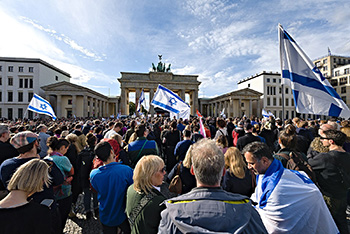From Our Archives
Debie Thomas, The Greatest Commandments (2020); Dan Clendenin, Numbering Our Days: Psalm 90 (2014); and The Very Rev. Dr. Jane Shaw, Love and Listening (2011).
For Sunday October 29, 2023
Lectionary Readings (Revised Common Lectionary, Year A)
Deuteronomy 34:1–12 or Leviticus 19:1–2, 15–18
Psalm 90:1–6, 13–17 or Psalm 1
1 Thessalonians 2:1–8
Matthew 22:34–46
This Week's Essay
A few days after the terrorist attacks on Israel by Hamas, I asked a Jewish friend for links to any analyses that he thought were especially helpful. "Sorry," he responded, "I don't have any answers. You can pick any conservative media to read about Hamas atrocities and the need for Israel to reoccupy Gaza, and even bomb Tehran. Or, choose a liberal outlet to read about the terrible plight of people in Gaza who live under Hamas rule and Israeli occupation, and their utter lack of any hope. Both are true."
The Israeli-Palestinian conflict has a long and complicated history. Now, more than ever, it feels like what the former Secretary of State Warren Christopher called a problem from hell. As my Jewish friend suggested, it's also easy to get stuck in narratives of superficial stereotypes. And who among us could claim any meaningful expertise in Middle East affairs? One place to start is the book by Ari Shavit called My Promised Land; The Triumph and Tragedy of Israel, which was on numerous lists for best books of 2013, and which Leon Wieseltier called "the least tendentious book about Israel I have ever read."
Another friend pushed me in a different direction. He suggested that, despite all the genuine complexities and extremist rhetoric, despite the understandable rage and despair on all sides, and the shared responsibilities of all the actors, "there are some things that should be said, yet shouldn't have to be said." In other words, we still can and should affirm some obvious and powerful truths. They are so obvious that we shouldn't even have to say them.
Terrorism is always wrong. Murdering and kidnapping innocent civilians is never justified. Posting executions online and dragging mutilated bodies through the streets is barbaric. So is starving civilians of food, water, fuel, electricity, and medicine. This catastrophe was not inevitable — it didn't have to happen.
In his article called "Your Jewish Friends Are Not Okay Right Now" (October 8, 2023), the journalist and rabbi Jay Michaelson also said something that must be said, even though you shouldn't have to say it: "I do know that it is possible to both oppose the occupation and condemn the murder of civilians. (Truthfully, I cannot believe I had to just write that sentence.) The occupation is morally wrong, and the violence inflicted on innocent civilians in Gaza and parts of the West Bank is completely unconscionable. The violence to come, which will also affect innocent civilians, keeps me awake at night."
 |
|
Solidarity protest for Israel in Berlin.
|
Nicholas Kristof likewise articulated something obvious that nonetheless must be said in his three op-eds in the NYT (October 11, 14, and 21, 2023), : "When you care about some humans but not others, you've lost your humanity… If you care about human life only in Israel or only in Gaza, then you don't actually care about humanity… If your moral compass is attuned to the suffering of only one side, your compass is broken, and so is your humanity." The pain of a grieving Israeli parent is no different than the anguish of a mother or father in Gaza. There's no "hierarchy of human life," urges Kristof, rather, "all lives are of equal value."
I find it helpful to consider the Israeli-Palestinian conflict within the broader sweep of history. We Christians have been just as polemically ideological as anyone. And we have our own shameful history of violence — we slaughtered Muslims in the Crusades, Jews in the Holocaust, Indigenous Americans, and we have slaughtered each other numerous times.
According to the Pentagon, the United States has about 220,000 personnel serving in more than 150 countries on about 800 military bases. Since 1775, we have been involved in over a hundred wars, some of them by necessity and others by choice. There has been a complicated mixture of good and evil. Entering and exiting those wars has never been simple.
The gospel for this week is so familiar that we should not have to say it, but we must continue to say it: "You shall love your neighbor as yourself." (Matthew 22:39). More importantly, and by some miracle of grace, we must not just say these words, but actually live them in real life.
For me, here in San Diego, in a mere ten house radius, my neighbors include American and Israeli Jews, Caribbean blacks, two Palestinian families from Ramallah in the West Bank, and friends from a dozen other countries. I found it deeply discouraging when a Christian friend expressed outright amazement that I knew the names of my neighbors.
Jesus linked our love of God with our love of neighbor. You cannot separate the two. To have one is to have the other, and to neglect one is to lose them both. This connection between claiming to love God and demonstrating that we love our neighbors became so embedded in the early Christian traditions that all three Gospels contain a version of this week's story (Matthew 22:34–46 = Mark 12:28–31 = Luke 10:27).
This command to love our neighbor is repeated almost verbatim by Paul (Romans 13:8–9, Galatians 5:14), by James (James 2:8), and most memorably by John: "If anyone says, 'I love God,' yet hates his brother, he is a liar. For anyone who does not love his brother, whom he has seen, cannot love God, whom he has not seen. And he has given us this command: Whoever loves God must also love his brother" (1 John 4:20–21).
 |
|
Solidarity protest for Palestine in Bangladesh.
|
A generation after the first believers, Justin Martyr (c. 100–165) summarized the appeal of a "holy" Christian community: “Those who once delighted in fornication now embrace chastity alone… we who once took most pleasure in accumulating wealth and property now share with everyone in need; we who hated and killed one another and would not associate with men of different tribes because of their different customs now, since the coming of Christ, live familiarly with them and pray for our enemies.”
Similarly, Tertullian (AD 155–220) wrote, "Our care for the derelict and our active love have become our distinctive sign before the enemy... See, they say, how they love one another and how ready they are to die for each other."
The gospel for this week reminded me of other Christian affirmations that should not have to be said, but that must be said. Those who know their Bibles will recognize that what follows are pretty much verbatim quotes from Scripture. They should express what Tertullian called the "distinctive signs" of our Christian communities.
God is the father of every human family, and the whole human family, such that there is no "them" but only "us." Honor and protect the dignity of every human being, for every person bears the image of God and is of equal value.
Blessed are the peacemakers. Love your enemies, do good to those who hate you, bless those who curse you, pray for those who mistreat you. Do to others as you would have them do to you.
You shall not kill. Do not oppress the stranger. Give special care for the poor, the widow, the alien, the orphan, the prisoner, the homeless, and the hungry. Remember the children, for they exemplify the kingdom of God. Live at peace with all people. Speak up for those who cannot speak for themselves, for the rights of all who are destitute. Speak up and judge fairly; defend the rights of the poor and needy. Do justice, and love kindness.
The Israeli-Palestinian war will continue with its own logic — with military strategies, political calculations, news coverage, the manipulation of social media (including AI), protests and vigils around the world, peace summits, and, let us hope, the legal constraints of international laws. These are important, but they are only part of the picture. Far more important is what David French calls "the moral challenge of war" that threatens us all. He concludes his op-ed with something that must be said, even though you shouldn't have to say it. This moral imperative warns all of us, "do not destroy your soul" in this horrible conflict. (NYT October 15, 2023).
For Further Reflection
Weekly Prayer
Walter Brueggemann (b. 1933)
Dreams and Nightmares
On reading 1 Kings 3:5-9; 9:2-9Last night as I lay sleeping,
I had a dream so fair . . .
I dreamed of the Holy City, well ordered and just.
I dreamed of a garden of paradise,
well-being all around and a good water supply.
I dreamed of disarmament and forgiveness,
and caring embrace for all those in need.
I dreamed of a coming time when death is no more.Last night as I lay sleeping . . .
I had a nightmare of sins unforgiven.
I had a nightmare of land mines still exploding
and maimed children.
I had a nightmare of the poor left unloved,
of the homeless left unnoticed,
of the dead left ungrieved.
I had a nightmare of quarrels and rages
and wars great and small.When I awoke, I found you still to be God,
presiding over the day and night
with serene sovereignty,
for dark and light are both alike to you.At the break of day we submit to you
our best dreams
and our worst nightmares,
asking that your healing mercy should override threats,
that your goodness will make our
nightmares less toxic
and our dreams more real.Thank you for visiting us with newness
that overrides what is old and deathly among us.
Come among us this day; dream us toward
health and peace,
we pray in the real name of Jesus
who exposes our fantasies.Walter Brueggemann (b. 1933), professor emeritus of Old Testament studies at Columbia Theological Seminary in Decatur, Georgia, has authored over seventy books. Taken from his Prayers for a Privileged People (Nashville: Abingdon, 2008), pp. 79-80.
Dan Clendenin: dan@journeywithjesus.net
Image credits: (1) Wikipedia.org and (2) Wikipedia.org.





